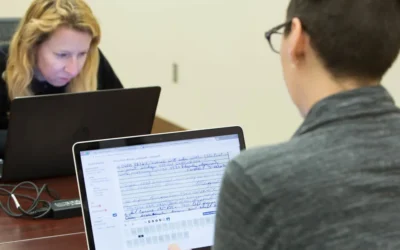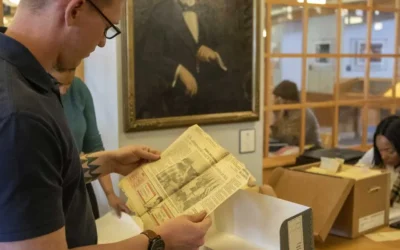The Professionalization of Archivists: An Overview
Margot Note
The role of archivists has always been in flux, responding to the needs of the information world and providing the unique skill sets that librarians, historians, and records managers may understand but do not hold. Archivists are colleagues to librarians, historians, and records managers, but are a distinct class unto themselves.
Archival Beginnings
Archives were first developed from historical societies at the end of the eighteenth century, research libraries in the nineteenth and twentieth centuries, and the rise of universities, which have employed many archivists. Archives have always reflected the culture and technology of the times. For instance, historical societies were established as part of the historical manuscripts tradition, which collected public records as well as personal papers. This happened in part because the development of the postal service created growth in correspondence.
Further Developments
In the United States, the archival profession first laid roots in the late 1890s within the American Historical Association (AHA), forming the Conference of Archivists in 1909. In the early 19th century, the fields of history and archives advanced enough that one organization could not serve both. In the mid-thirties, the National Archives and the Society of American Archivists were formed, providing a professional identity to archivists. This was an important vocational moment because archivists were formally differentiating themselves from historians.
A Maturity of the Field
The rise of social history, new repositories, and professional associations fueled an influx of archivists in the 1970s. From the 1970s on, another crucial development of the profession was standardization. Collection distinctiveness is the point where librarians and archivists differ professionally. Although libraries may house rare or special collections, most of their holdings are published monographs, which have copies around the world with similar cataloging. Archivists, however, preserve and protect unique records, without counterparts. Archivists routinely manage information that crosses many technological and administrative barriers during its life cycle. Since archival content differs at each repository, archivists must employ some type of standardization or best practices to provide access and give meaning to the collections.
As the technology of the 20th century allowed more records to be kept, there also became the need to distinguish between records managers and archivists. Archivists work with the permanently valuable records of an organization that no longer needs them for business purposes. Archivists make records available to researchers to document the history of the organization as well as the larger society. Records managers work with records no longer needed for everyday use, which may be temporary, awaiting a destruction date in congress with local, state, and federal law, or permanent, awaiting transfer to an archives. Traditionally, records managers do not grant access to these records for research because the organization still has legal control of them, thus controlling access to the records.
Advocating for the Profession
Despite the distinct professional identity that archivists hold, the profession is not as well known as similar professions like librarianship. Archivists face complex communication challenges within and outside of their organizations. The absence of a standard university degree and a distinct career path affects how others with limited knowledge of the field perceive them. The Society of American Archivists has, for example, has done considerable work to give archivists the tools to advocate for themselves, including developing tips for creating an elevator speech to explain our roles to others. Archivists have discovered the importance of sharing the excitement of what they do to those that would benefit from using archival materials, if only they knew about their benefits. Archivists continue to convey the enthusiasm, stimulation, and fulfillment they feel as they work with records of enduring value.
Margot Note
Margot Note, archivist, consultant, and author is a guest blogger for Lucidea, provider of ArchivEra, archival collections management software for today’s challenges and tomorrow’s opportunities. Read more of Margot’s posts here, and get your free copy of Margot’s whitepaper, Digital Sustainability: the Archivist’s Path Forward.
Similar Posts
Collaborative Archival Relationships
Collaborative projects are instrumental in showcasing how archival collections can benefit various organizational departments.
Informational, Evidential, and Intrinsic Values within Archives
Archives provide authentic, reliable information and hold values that reflect their functions and uses; informational, evidential, and intrinsic.
A Sustainable Archives
Archivists prioritize sustainable practices and policies, rooting their work in ethics of care, often preferring digital processing and preservation
Archival Branding and PR Strategies
Archivists who adopt branding and PR strategies both safeguard historical treasures and contribute to their organizations’ evolution.




Leave a Comment
Comments are reviewed and must adhere to our comments policy.
0 Comments